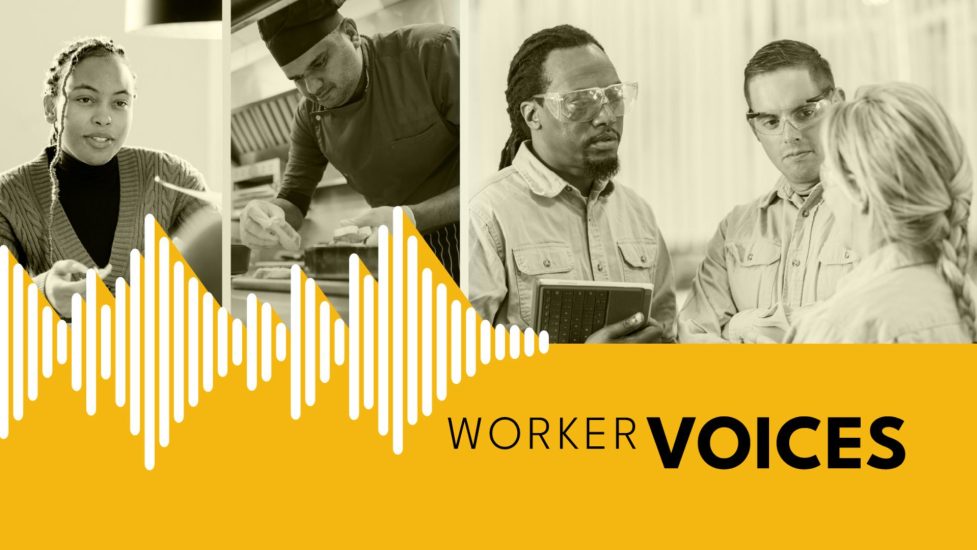Nearly every American worker felt the impact of the COVID economic tidal wave at some point in some way over the three-plus years of the pandemic. For millions of the most vulnerable workers going into the health and economic crisis, they took the hardest blows and they are still feeling the impact today.
But, they also have a new outlook on the important role they play in today’s economy and are finding ways to better position themselves in the labor market, including through upskilling and reskilling.
Worker Voices: Shifting Perspectives and Expectations on Employment – new research from the Federal Reserve System – examines the current labor market from the perspective and experiences of low-wage workers – not through data, but through conversations with these workers around the country over the past year.
“The individuals who often feel the greatest impact of economic shocks are those who are already in financially unstable positions. In the job market, this includes low-wage workers, workers of color, and workers without a four-year degree.
– Worker Voices, research from the U.S. Federal Reserve System
“These workers bore the brunt of the initial pandemic layoffs, with increased job loss and rising instability of work. Previous downturns have demonstrated that these individuals are the first to lose their jobs and are slower to rebuild assets during subsequent recoveries.”
The report points out that one of the unique roles of the Federal Reserve is to “take the pulse of economic conditions. Doing so helps achieve the Fed’s dual mandate of price stability and maximum employment.”
Worker Voices shares what the Federal Reserve learned about how the pandemic impacted the low-wage workers during the crisis and how their experiences continue to reverberate on a macroeconomic level, particularly in how they are navigating the labor market now.
Key Conclusion: Low-Wage Earners Had Difficult Balance of Health and Financial Concerns
The conversations affirmed what much of what we learned at the time of the pandemic. Workers in lower-wage jobs had to weigh the health risks and demands of their family responsibilities – such as acting as a caregiver – with their financial needs and obligations during COVID.
Here are the words of one of the people interviewed.
“I’ll say for me, it wasn’t really easy. It was very challenging, because … I was very concerned for my health and for the health of my child. … I was also very scared because I thought maybe I could lose my job and I wasn’t going to be able to provide the necessary means for my children. And it was a very tough and challenging moment for me.”
– Worker Voices participant
And while the research participants agreed that “pandemic-related benefits and relief through extended unemployment insurance and stimulus funds cause a smoothing effect on dire financial situations,” they said it wasn’t enough money for them to be able to stay home. In other words, they still had to work.
Key Conclusion: A Tight Labor Market Hasn’t Benefited All Workers Equally
Since the pandemic, we’ve been in a fairly tight labor market, one in which there are more jobs than people looking for work. Still, not everyone has benefitted. Many of the research participants reported they were struggling to find a job, sometimes putting in as many as 100 jobs applications, only to find that they were not what the employer was looking for.
According to the report, these low-wage workers without four-year degrees to feel the “strain of labor shortages, taking on more and more responsibility in their jobs without an increase in wages. This had sometimes to led to mental, physical, and financial stress, as well as burnout.”
They further explained that being told that they were not the right candidate, despite the labor shortage, left them confused and frustrated.
Key Conclusion: Workers Expressed Enhanced Expectations of Job Quality
Perhaps some of that confusion and frustration is the result of the knowledge that these workers are a vital part of the economic fabric of the country. Thus, there’s also been a shift in what workers expect in a current job and look for in a new one. Compensation is still in important, but many participants in the research say that there are other elements that make up a quality job – dignity and respect, job stability, safety, and flexibility for a better work-life balance.
“I think during the pandemic – it kind of flipped the tables a little bit. … I know that I can bring a lot to the table. Are you going to uphold your end of the half as an employer? So at least for me, it gave me a different perspective of … don’t settle for less.
– Worker Voices participant
Key Conclusion: Many Workers are Reinventing Themselves Through Skills Development
The workers who took part in the Fed listening research say they’ve learned something else important in the three years since the pandemic first shook the economy – the role upskilling and reskilling can have in improving their economic opportunities and landing them better quality jobs.
“I’m trying to transition to software development. I’m going into software, going to working remotely. I feel like there’s more [job] security in that area. So, I’ve been taking some tutorials. It’s not been easy, but I’m still pushing through.”
– Worker Voices participant
According to the Worker Voices report, “Workers shared how they were actively pursuing many forms of self-investment and improvement. These included formal learning through institutions of higher education or workforce training programs, bootcamps, and personal enrichment courses, as well as self-directed learning through online platforms such as YouTube.
“Others talked about their aspirations to engage in entrepreneurship or self-employment for nonfinancial benefits, such as being one’s own boss and having flexibility, because they felt the jobs available were not providing those benefits.”
The participants see short-term and long-term goals in upskilling and reskilling, including economic mobility now and economic stability in the future.
There is much more in the report, including ‘next steps’ recommendations. You can read Worker Voices online at the Fed Communities website.











